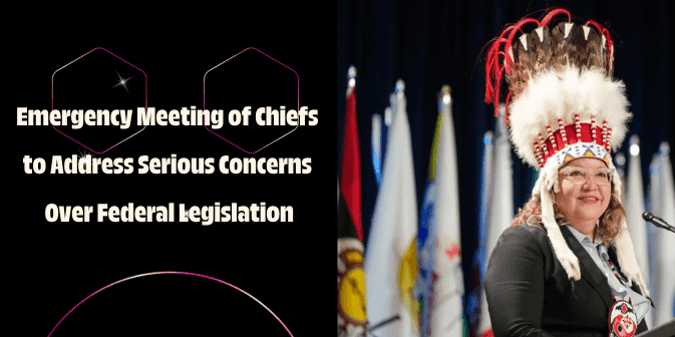First Nations Chiefs Call Urgent Meeting to Oppose New Federal Legislation

Chief Cindy Woodhouse Nepinak expressed concerns over current draft of bill. (Image: Christinne Muschi /The Canadian Press)
The Assembly of First Nations (AFN) has issued an urgent call for an Emergency Meeting of Chiefs across Canada to address serious concerns over new federal legislation recently introduced in Parliament.
This legislation, championed by Prime Minister Mark Carney, aims to fast-track major projects deemed in the national interest, such as infrastructure development, trade barriers removal, and increased labour mobility. However, it faces strong opposition from the AFN, who warn that it could jeopardise First Nations’ rights, lands, and governance. There could be implications for the casino industry in Canada.
Impact of New Federal Legislation on First Nations Rights and Lands
In a letter dated May 30, AFN National Chief Cindy Woodhouse Nepinak expressed grave concerns that the bill, as currently drafted, “poses a serious threat to First Nations exercise of Treaty rights, inherent rights, title, and jurisdiction.” She highlighted that the legislation was introduced without meaningful consultation or consent from First Nations communities, violating principles protected under the United Nations Declaration on the Rights of Indigenous Peoples (UNDRIP) and the Canadian Constitution, particularly the principle of Free, Prior, and Informed Consent (FPIC).
Implications for First Nations-Owned Businesses, Including Casinos
This legislation could have far-reaching impacts on First Nations’ economic enterprises, notably casinos and gaming operations, which are vital sources of revenue and community development. Many First Nations own and operate casinos on their traditional lands, serving as key economic engines that fund healthcare, education, infrastructure, and cultural initiatives.
Historically, legislative and regulatory changes that bypass Indigenous consultation have led to challenges for these businesses. For example, past efforts to regulate gaming without proper consultation have resulted in legal disputes, restrictions, or uncertainty that hindered expansion plans and threatened the viability of existing operations. If similar legislation is pushed through without respecting treaty rights and land claims, First Nations casinos could face licensing hurdles, increased regulatory scrutiny, or even restrictions on land use—undermining their ability to generate revenue and support community growth.
The Upcoming Emergency Online Forum
Scheduled for early next week (date to be confirmed), the virtual forum will bring together Chiefs from across Canada to review the legislation, receive legal and political analyses, and gather collective feedback. The primary goal is to determine a unified response aimed at safeguarding First Nations’ rights, lands, and economic interests—including their gaming enterprises.
As Archie Wabasse emphasized on social media, “This is a critical moment to defend Treaty rights and demand that First Nations be recognized as full partners in nation-building efforts.” Community leaders will participate actively to ensure that the voices of Wunnumin Lake First Nation and other nations are heard, and that their rights, lands, and future generations are protected.
Strategies for First Nations Casinos Amid Legislative Threats
Given the potential threats, First Nations businesses involved in gaming should consider several strategic actions:
For Legal Preparedness they might engage legal experts to review the legislation and assess its impact on existing gaming rights and land use agreements.
For advocacy they could mobilise collective advocacy efforts to ensure that Indigenous rights are recognised and protected during legislative debates.
With regards to community engagement, they may Inform and involve community members and stakeholders about the implications of the legislation.
There may be some strategic planning like developing contingency plans for business operations in case of regulatory changes, including exploring alternative land use options or diversifying revenue streams.
Partnerships might consider strengthening alliances with other Indigenous nations and supportive organisations to amplify collective voices and negotiate better protections.
Threat to Sustainability of Community Owned Casinos
The outcome of this emergency meeting could significantly influence the future of First Nations’ sovereignty and economic development, particularly for vital revenue-generating enterprises like casinos. Fast-tracking legislation without proper consultation risks undermining Indigenous self-determination and could threaten the sustainability of community-owned businesses.
Members and stakeholders are encouraged to stay informed, participate in discussions, and support efforts to ensure that First Nations’ rights and economic interests are fully recognised and protected.
Meet The Author
Experience

Most of my career was spent in teaching including at one of the UK’s top private schools. I left London in 2000 and set up home in Wales raising four beautiful children. I enrolled at University where I studied Photography and film and gained a Degree and subsequently a Masters Degree. In 2014 I helped launch a new local newspaper and managed to get front and back page as well as 6 filler pages on a weekly basis. I saw that journalism was changing and was a pioneer of hyperlocal news in Wales. In 2017 I started one of the first 24/7 free independent news sites for Wales. Having taken that to a successful business model I was keen for a new challenge. Joining the company is exciting for me especially as it is a new role in Europe. I am keen to establish myself and help others to do the same.
Read Full BioRelated News







